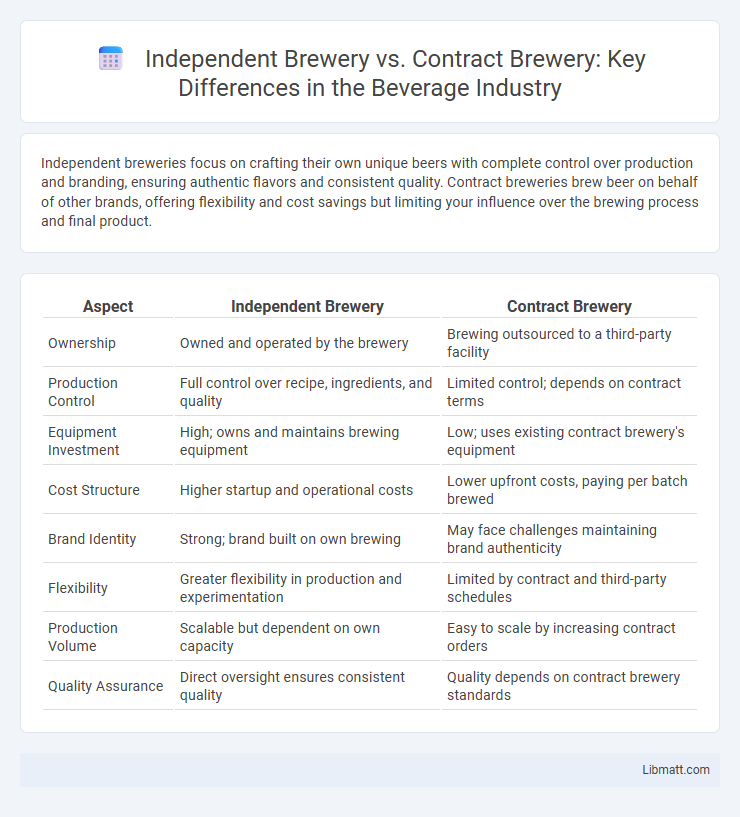Independent breweries focus on crafting their own unique beers with complete control over production and branding, ensuring authentic flavors and consistent quality. Contract breweries brew beer on behalf of other brands, offering flexibility and cost savings but limiting your influence over the brewing process and final product.
Table of Comparison
| Aspect | Independent Brewery | Contract Brewery |
|---|---|---|
| Ownership | Owned and operated by the brewery | Brewing outsourced to a third-party facility |
| Production Control | Full control over recipe, ingredients, and quality | Limited control; depends on contract terms |
| Equipment Investment | High; owns and maintains brewing equipment | Low; uses existing contract brewery's equipment |
| Cost Structure | Higher startup and operational costs | Lower upfront costs, paying per batch brewed |
| Brand Identity | Strong; brand built on own brewing | May face challenges maintaining brand authenticity |
| Flexibility | Greater flexibility in production and experimentation | Limited by contract and third-party schedules |
| Production Volume | Scalable but dependent on own capacity | Easy to scale by increasing contract orders |
| Quality Assurance | Direct oversight ensures consistent quality | Quality depends on contract brewery standards |
Introduction: Defining Independent and Contract Breweries
Independent breweries own and operate their brewing facilities, maintaining full control over the production process, recipe development, and branding. Contract breweries outsource their beer production to third-party facilities, allowing them to focus on marketing and distribution without owning physical brewing assets. This distinction impacts the scale, costs, and creative control inherent in each brewing model.
Origins and Growth: The Evolution of Brewing Models
Independent breweries originate from passionate brewers crafting unique beers in-house, allowing full control over recipes and production quality. Contract breweries emerged as a cost-effective solution, enabling brands to outsource brewing to established facilities without investing in their own equipment. Your choice between independent and contract brewing impacts brand authenticity, scalability, and growth potential within the evolving craft beer market.
Ownership and Control: Who Runs the Brewery?
An independent brewery is owned and operated by its founders or a dedicated team, giving them full control over production, recipes, and branding decisions. In contrast, a contract brewery outsources its beer production to a third-party facility, which handles brewing under the contract brewer's specifications but retains operational control of the equipment and processes. Ownership in contract brewing remains with the hiring company, but day-to-day control lies with the contract brewery, limiting the original brand's direct involvement in manufacturing.
Brand Identity and Authenticity
Independent breweries control their brand identity and maintain authenticity by owning the entire brewing process, creating unique, consistent flavors that reflect their vision and local culture. Contract breweries produce beer on behalf of other brands, which can limit the original brand's control over quality and authenticity, potentially diluting its unique identity. Consumers often perceive independent breweries as more genuine and connected to craft traditions, while contract brewing may be viewed as more commercial or mass-produced.
Production Capacity and Scalability
Independent breweries often have limited production capacity constrained by their own facilities and equipment, which can restrict scalability but ensures full control over quality and processes. Contract breweries offer significantly higher scalability by utilizing third-party facilities with larger, more flexible production capacities, enabling rapid expansion without the need for capital-intensive investments. This model allows brands to increase output quickly while focusing resources on marketing and distribution instead of brewing infrastructure.
Quality Control and Consistency
Independent breweries maintain direct oversight of the entire brewing process, ensuring stringent quality control and consistent flavor profiles across batches. Contract breweries rely on third-party facilities for production, which can introduce variability due to differing equipment, ingredients, and processes. This reliance often challenges maintaining consistent quality and specific taste characteristics that independent breweries typically guarantee.
Distribution Channels and Market Reach
Independent breweries maintain control over their distribution channels, allowing direct relationships with local retailers, bars, and consumers, which often results in stronger brand loyalty and regional market presence. Contract breweries rely on third-party producers to brew their recipes, enabling expanded market reach through established distribution networks without the need for owning production facilities. Your choice between these models impacts how widely your product is available and how much influence you have over its placement and marketing.
Economic Impact and Community Involvement
Independent breweries drive local economies by creating jobs, sourcing ingredients from nearby farmers, and attracting tourism that supports auxiliary businesses. Contract breweries often reduce overhead costs by outsourcing production, which can limit direct community engagement and economic contributions to the local area. Your support of independent breweries fuels community development and sustains regional economic growth through reinvestment and active involvement.
Consumer Perception and Trends
Independent breweries are often perceived by consumers as more authentic and innovative, promoting a strong local identity and artisanal quality that appeals to craft beer enthusiasts. Contract breweries, while sometimes viewed as less genuine due to outsourcing production, can leverage consistent quality and broader distribution to meet growing demand in mainstream markets. Current trends reveal a rising preference for independent breweries as consumers increasingly seek unique, small-batch flavors that emphasize sustainability and community support.
Choosing the Right Path: Which Model Suits Your Vision?
Independent breweries maintain full control over production, branding, and distribution, allowing for complete creative freedom and unique product development aligned with the founder's vision. Contract breweries leverage established facilities to produce recipes without the need for capital investment in equipment, ideal for startups seeking reduced overhead and faster market entry. Evaluating factors like financial capacity, desired control, scalability, and long-term goals helps determine whether an independent or contract brewing model best supports growth and brand identity.
Independent brewery vs contract brewery Infographic

 libmatt.com
libmatt.com